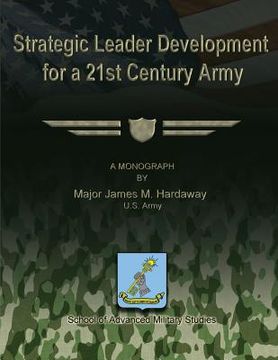Compartir
Strategic Leader Development for a 21st Century Army (en Inglés)
U. S. Army Major James M. Hardaway
(Autor)
·
School Of Advanced Military Studies
(Contribuciones de)
·
Createspace Independent Publishing Platform
· Tapa Blanda
Strategic Leader Development for a 21st Century Army (en Inglés) - Studies, School Of Advanced Military ; Hardaway, U. S. Army Major James M.
$ 15.19
$ 18.99
Ahorras: $ 3.80
Elige la lista en la que quieres agregar tu producto o crea una nueva lista
✓ Producto agregado correctamente a la lista de deseos.
Ir a Mis ListasSe enviará desde nuestra bodega entre el
Lunes 08 de Julio y el
Martes 09 de Julio.
Lo recibirás en cualquier lugar de Estados Unidos entre 1 y 3 días hábiles luego del envío.
Reseña del libro "Strategic Leader Development for a 21st Century Army (en Inglés)"
As the nature of warfare evolves, the Army must produce leaders who comfortably interact with diverse populations and embrace complexity. This emerging truth dictates a need for change in how Army officers are trained and selected to lead at the highest levels in order to regain the initiative in managing today's fluid operational environment. The concept of strategic leadership, therefore, must be examined closely in Army doctrine. Social, cultural, and complex problem-solving skills are becoming a priority and must be developed in young officers to provide enough knowledge for senior leaders to leverage later in their careers. Rarely does the typical Army career prepare someone to succeed in the strategic arena where the non-military elements of national power carry greater effects than large numbers of troops and equipment. The basic question addressed in this study is "how effective is the U.S. Army at developing strategic thinkers capable of leading decisively in complex and adaptive environments?" To answer this question, three distinct areas are analyzed: (1) the ability of the Officer Education System (OES) to distinguish critical abilities deemed necessary to succeed in the modern security environment, (2) the ability of the Officer Evaluation Reporting System (OERS) to measure an individual's dedication to self study and lifelong education, and (3) the ability of the same OERS to measure individual skills acquired through operational experience. The Army's current OES pushes the most complex topics to the final stages of an officer's educational career. As a result, few officers get a chance to expand their intellectual boundaries through critical and creative thinking prior to their field grade experience. Doing business this way denies the opportunity for junior level officers to develop the requisite skills needed to excel in the strategic arena. The Army must promote advanced educational opportunities as healthy and necessary to a young officer's career. As the key process for reporting a leader's abilities and potential for advancement, the OERS focuses primarily on current performance and provides little incentive to highlight an officer's dedication to career-long professional development. The over-valuing of short-term success negates the potential benefits of continuous learning, a long-term endeavor. The result of such short-sightedness stifles innovation while entrenching a "business as usual" approach to leadership development ignoring the changing operational environment. The personnel management system continues to emphasize combat deployments, regardless of skills acquired, over an officer's need for professional development. The current version of the OER fails to utilize the leader development aspects it was designed to accomplish. The Army must look into traits and attributes particular to leaders at the senior levels in order to develop context-based evaluation systems. Junior and senior level leaders should not be evaluated on the same scale. A way to accomplish this is to establish qualitative standards for branch qualification based on operational experiences, not just on the number of months assigned. To force a change in the culture and career progression of leaders prepared for 21st century warfare, the officer education and evaluation methodologies must adapt to reflect the complexities of the contemporary operating environment. To accomplish this, the Army must adjust its leader development systems to recognize and promote strategic thinking much earlier than in past generations.
- 0% (0)
- 0% (0)
- 0% (0)
- 0% (0)
- 0% (0)
Todos los libros de nuestro catálogo son Originales.
El libro está escrito en Inglés.
La encuadernación de esta edición es Tapa Blanda.
✓ Producto agregado correctamente al carro, Ir a Pagar.

